The Ecological Compensation Mechanism in a Cross-Regional Water Diversion Project Using Evolutionary Game Theory: The Case of the Hanjiang River Basin, China
Abstract
1. Introduction
- What is the difference in the evolution of the game between upstream and downstream governments before and after the introduction of the central government?
- How do opportunity costs affect the decision-making behavior of upstream governments?
- Is the current compensation rate from the central government to upstream governments in the HJRB reasonable?
2. Case Overview
3. Theoretical Background
3.1. Static Game Theory
3.2. Evolutionary Game Theory
- The payoff matrix: The payoff matrix is the basis of evolutionary game analysis. Different strategies of game subjects can form multiple strategy combinations, and the payoffs of different strategy combinations can be reflected in the form of a matrix [57].
- The replicated dynamic system: The replicated dynamic system maps the relationship between the behavior of game subjects and fitness, which is the core concept of evolutionary biology and can be understood as the growth of the number of individuals who choose a certain strategy after the game [58].
- The evolutionary stabilization strategy: When the evolutionary game model reaches a stable state, the strategic combination of all game participants is referred to as the evolutionary stabilization strategy, which reflects the equilibrium concept of evolutionary game theory [59]. Watershed ecological compensation is a complex and dynamic process. Therefore, it is more reasonable to analyze this process by using evolutionary game theory.
4. Methodology
4.1. Scenarios
- Upstream governments: The water quality upstream of the basin is better than that downstream, and the degradation of ecosystem services caused by the deterioration of the water environment has less of an impact on economic and social development in the upstream area. In addition, because the effectiveness of water environment management is difficult to see immediately, upstream governments, as the main management party, may choose to pollute the water environment in exchange for economic development and lower their priority for environmental protection. However, the upstream area is also the water source of the cross-regional water diversion project and faces intense pressure from the receiving area for high-quality water resources.
- Downstream governments: Due to the implementation of the cross-regional water diversion project, the water environment in the downstream area is becoming increasingly severe. The quality of life of people in the downstream area is closely related to the water environment, so downstream governments have a more urgent need to improve the water environment than upstream governments. Constrained by the horizontal compensation mechanism upstream and downstream of the basin, downstream governments compensate upstream governments to encourage them to protect the water environment. Reciprocally, when upstream governments’ environmental governance policies are ineffective, downstream governments refuse to compensate them, resulting in a lack of funds for upstream governments’ treatment. The whole watershed ecological compensation system can thus fall into a prisoner’s dilemma.
- The central government: To ensure the sustainability of the cross-regional water diversion project and to provide clean water to the receiving area, the central government actively promotes the implementation of watershed management by upstream governments. To ease the burden on the central government, it encourages local governments in the basin to establish a horizontal compensation system, as the outcome of the basin’s ecological management depends on the level of investment in water protection by the local governments in the basin. In this system, the central government has the authority to monitor upstream governments to protect the water environment and requires downstream governments to compensate upstream governments. The central government emphasizes that environmental protection is a prerequisite for economic development and is the optimal strategy expected by the public. The central government resorts to financial and administrative penalties to induce upstream and downstream governments to cooperate to meet this public expectation.
4.2. Hypothesis
- H1: The rights and obligations of upstream and downstream governments are not exactly equal. They have the same power to use water resources, and the central government can supervise them.
- H2: Upstream, downstream, and central governments want to maximize their interests in the game process.
- H4: Upstream, downstream, and central governments are bounded rational, which means that they cannot determine the optimal strategy at one time. Nevertheless, they can continuously adjust their strategies in continuous games and ultimately achieve the optimal strategy.
4.3. Variables
- C1: Costs incurred by upstream governments in protecting the water environment.
- C2: Costs incurred by downstream governments in compensating.
- A1: The ecological benefits of upstream governments when they protect the water environment and downstream governments compensate them.
- A2: Ecological benefits of downstream governments when upstream governments protect the water environment and downstream governments compensate them.
- B1: Ecological benefits of upstream governments when upstream governments protect the water environment, but downstream governments do not compensate them.
- D2: Ecological benefits of downstream governments when upstream governments protect the water environment, but downstream governments do not compensate them.
- D1: Ecological benefits of upstream governments when downstream governments pay a compensation fee, but upstream governments do not protect the water environment.
- B2: Ecological benefits of downstream governments when they compensate but upstream governments do not protect the water environment.
- S1: To promote collaboration between upstream and downstream governments, the central government financially compensates upstream governments.
- S2: To promote collaboration between upstream and downstream governments, the central government financially compensates downstream governments.
- F1: The central government penalizes upstream governments when upstream and downstream governments fail to adopt proper watershed protection policies.
- F2: The central government penalizes downstream governments when upstream and upstream governments fail to adopt proper watershed protection policies.
4.4. Research Design
5. Model Building
5.1. Evolutionary Game Model of Watershed Ecological Compensation with Non-Supervision of the Central Government
5.2. Evolutionary Game Model of Watershed Ecological Compensation with the Supervision of the Central Government
6. Model Testing
6.1. The Reality of Ecological Compensation in the HJRB
6.2. Parameter Partial Regression Model of Watershed Ecological Compensation Measurement
6.3. Analysis of Model Regression Results
7. Discussion
7.1. Watershed Ecological Compensation with Non-Supervision of the Central Government
7.2. Watershed Ecological Compensation with the Supervision of the Central Government
7.3. The Relationship between Opportunity Costs and the Decision-Making Behavior of Upstream Governments in the HJRB
7.4. Comparison with Previous Literature
8. Conclusions
- The initial willingness to cooperate directly affects the final steady state of the evolutionary game model.
- In contrast to the findings in the previous literature, we argue that even without the regulation of the central government, it is still possible for upstream and downstream governments to reach a steady state spontaneously, provided their initial willingness to cooperate is high, although doing so may consume more time.
- The regulation of the central government can effectively lead to cooperation between upstream and downstream governments so that the game model can quickly reach a stable state.
- Opportunity costs significantly influence which strategy is adopted by upstream governments, and the current amount of compensation from the central government is significantly lower than the opportunity costs of treating the water environment for upstream governments in the HJRB.
Author Contributions
Funding
Institutional Review Board Statement
Informed Consent Statement
Data Availability Statement
Conflicts of Interest
References
- Varis, O.; Vakkilainen, P. China’s 8 Challenges to Water Resources Management in the First Quarter of the 21st Century. Geomorphology 2001, 41, 93–104. [Google Scholar] [CrossRef]
- Wang, Y.; Jiang, R.; Xie, J.; Zhao, Y.; Li, F. Water Resources Management under Changing Environment: A Systematic Review. J. Coast. Res. 2020, 104, 29–41. [Google Scholar] [CrossRef]
- Ma, T.; Sun, S.; Fu, G.; Hall, J.W.; Ni, Y.; He, L.; Yi, J.; Zhao, N.; Du, Y.; Pei, T.; et al. Pollution Exacerbates China’s Water Scarcity and Its Regional Inequality. Nat. Commun. 2020, 11, 650. [Google Scholar] [CrossRef] [PubMed]
- Lapworth, D.J.; Baran, N.; Stuart, M.E.; Ward, R.S. Emerging Organic Contaminants in Groundwater: A Review of Sources, Fate and Occurrence. Environ. Pollut. 2012, 163, 287–303. [Google Scholar] [CrossRef] [PubMed]
- Schwarzenbach, R.P.; Egli, T.; Hofstetter, T.B.; von Gunten, U.; Wehrli, B. Global Water Pollution and Human Health. Annu. Rev. Environ. Resour. 2010, 35, 109–136. [Google Scholar] [CrossRef]
- Huang, F.; Wang, X.; Lou, L.; Zhou, Z.; Wu, J. Spatial Variation and Source Apportionment of Water Pollution in Qiantang River (China) Using Statistical Techniques. Water Res. 2010, 44, 1562–1572. [Google Scholar] [CrossRef] [PubMed]
- Fan, W.; Wang, S.; Gu, X.; Zhou, Z.; Zhao, Y.; Huo, W. Evolutionary Game Analysis on Industrial Pollution Control of Local Government in China. J. Environ. Manag. 2021, 298, 113499. [Google Scholar] [CrossRef] [PubMed]
- Zeng, Y.; Li, J.; Cai, Y.; Tan, Q.; Dai, C. A Hybrid Game Theory and Mathematical Programming Model for Solving Trans-Boundary Water Conflicts. J. Hydrol. 2019, 570, 666–681. [Google Scholar] [CrossRef]
- Gao, X.; Shen, J.; He, W.; Sun, F.; Zhang, Z.; Guo, W.; Zhang, X.; Kong, Y. An Evolutionary Game Analysis of Governments’ Decision-Making Behaviors and Factors Influencing Watershed Ecological Compensation in China. J. Environ. Manag. 2019, 251, 109592. [Google Scholar] [CrossRef] [PubMed]
- Just, R.E.; Netanyahu, S. Conflict and Cooperation on Trans-Boundary Water Resources; Springer Science & Business Media: Berlin/Heidelberg, Germany, 1998; ISBN 978-0-7923-8106-8. [Google Scholar]
- Talukder, B.; Hipel, K.W. Diagnosis of Sustainability of Trans-Boundary Water Governance in the Great Lakes Basin. World Dev. 2020, 129, 104855. [Google Scholar] [CrossRef]
- Yu, X. Transboundary Water Pollution Management Lessons Learned from River Basin Management in China, Europe and the Netherlands. Utrecht Law Rev. 2011, 7, 188–203. [Google Scholar] [CrossRef]
- Zhao, L.; Li, C.; Huang, R.; Si, S.; Xue, J.; Huang, W.; Hu, Y. Harmonizing Model with Transfer Tax on Water Pollution across Regional Boundaries in a China’s Lake Basin. Eur. J. Oper. Res. 2013, 225, 377–382. [Google Scholar] [CrossRef]
- Lee, K.M.; Lai, C.W.; Ngai, K.S.; Juan, J.C. Recent Developments of Zinc Oxide Based Photocatalyst in Water Treatment Technology: A Review. Water Res. 2016, 88, 428–448. [Google Scholar] [CrossRef]
- Vatn, A. An Institutional Analysis of Payments for Environmental Services. Ecol. Econ. 2010, 69, 1245–1252. [Google Scholar] [CrossRef]
- Muradian, R.; Corbera, E.; Pascual, U.; Kosoy, N.; May, P.H. Reconciling Theory and Practice: An Alternative Conceptual Framework for Understanding Payments for Environmental Services. Ecol. Econ. 2010, 69, 1202–1208. [Google Scholar] [CrossRef]
- Wunder, S. Revisiting the Concept of Payments for Environmental Services. Ecol. Econ. 2015, 117, 234–243. [Google Scholar] [CrossRef]
- Pei, S.; Zhang, C.; Liu, C.; Liu, X.; Xie, G. Forest Ecological Compensation Standard Based on Spatial Flowing of Water Services in the Upper Reaches of Miyun Reservoir, China. Ecosyst. Serv. 2019, 39, 100983. [Google Scholar] [CrossRef]
- Hu, Y.; Huang, J.; Hou, L. Impacts of the Grassland Ecological Compensation Policy on Household Livestock Production in China: An Empirical Study in Inner Mongolia. Ecol. Econ. 2019, 161, 248–256. [Google Scholar] [CrossRef]
- Maron, M.; Hobbs, R.J.; Moilanen, A.; Matthews, J.W.; Christie, K.; Gardner, T.A.; Keith, D.A.; Lindenmayer, D.B.; McAlpine, C.A. Faustian Bargains? Restoration Realities in the Context of Biodiversity Offset Policies. Biol. Conserv. 2012, 155, 141–148. [Google Scholar] [CrossRef]
- Feng, D.; Wu, W.; Liang, L.; Li, L.; Zhao, G. Payments for Watershed Ecosystem Services: Mechanism, Progress and Challenges. Ecosyst. Health Sustain. 2018, 4, 13–28. [Google Scholar] [CrossRef]
- Han, D.; Currell, M.J.; Cao, G. Deep Challenges for China’s War on Water Pollution. Environ. Pollut. 2016, 218, 1222–1233. [Google Scholar] [CrossRef] [PubMed]
- Xiao, M.; Bao, F.; Wang, S.; Cui, F. Water Quality Assessment of the Huaihe River Segment of Bengbu (China) Using Multivariate Statistical Techniques. Water Resour. 2016, 43, 166–176. [Google Scholar] [CrossRef]
- Xu, H.; Paerl, H.W.; Qin, B.; Zhu, G.; Hall, N.S.; Wu, Y. Determining Critical Nutrient Thresholds Needed to Control Harmful Cyanobacterial Blooms in Eutrophic Lake Taihu, China. Environ. Sci. Technol. 2015, 49, 1051–1059. [Google Scholar] [CrossRef] [PubMed]
- Guo, C.; Chen, Y.; Xia, W.; Qu, X.; Yuan, H.; Xie, S.; Lin, L.-S. Eutrophication and Heavy Metal Pollution Patterns in the Water Suppling Lakes of China’s South-to-North Water Diversion Project. Sci. Total Environ. 2020, 711, 134543. [Google Scholar] [CrossRef]
- Liu, Y.; Wang, A.; Wu, Y. Environmental Regulation and Green Innovation: Evidence from China’s New Environmental Protection Law. J. Clean Prod. 2021, 297, 126698. [Google Scholar] [CrossRef]
- Zhang, L.; Li, S.; Loaiciga, H.A.; Zhuang, Y.; Du, Y. Opportunities and Challenges of Interbasin Water Transfers: A Literature Review with Bibliometric Analysis. Scientometrics 2015, 105, 279–294. [Google Scholar] [CrossRef]
- Wan, X.; Wang, R.; Wang, M.; Deng, J.; Zhou, Z.; Yi, X.; Pan, J.; Du, Y. Online Public Opinion Mining for Large Cross-Regional Projects: Case Study of the South-to-North Water Diversion Project in China. J. Manag. Eng. 2022, 38, 05021011. [Google Scholar] [CrossRef]
- Cheng, X.; Yang, Y.; Li, M.; Dou, X.; Zhang, Q. The Impact of Agricultural Land Use Changes on Soil Organic Carbon Dynamics in the Danjiangkou Reservoir Area of China. Plant Soil 2013, 366, 415–424. [Google Scholar] [CrossRef]
- Liu, W.; Kuo, Y.-M.; Zhao, E. Influence of the South-to-North Water Transfer and the Yangtze River Mitigation Projects on the Water Quality of Han River, China. Environ. Earth Sci. 2021, 80, 246. [Google Scholar] [CrossRef]
- Fu, Y.; Zhang, J.; Zhang, C.; Zang, W.; Guo, W.; Qian, Z.; Liu, L.; Zhao, J.; Feng, J. Payments for Ecosystem Services for Watershed Water Resource Allocations. J. Hydrol. 2018, 556, 689–700. [Google Scholar] [CrossRef]
- Gao, X.; Shen, J.; He, W.; Sun, F.; Zhang, Z.; Zhang, X.; Yuan, L.; An, M. Multilevel Governments’ Decision-Making Process and Its Influencing Factors in Watershed Ecological Compensation. Sustainability 2019, 11, 1990. [Google Scholar] [CrossRef]
- Kuo, Y.-M.; Liu, W.; Zhao, E.; Li, R.; Munoz-Carpena, R. Water Quality Variability in the Middle and down Streams of Han River under the Influence of the Middle Route of South-North Water Diversion Project, China. J. Hydrol. 2019, 569, 218–229. [Google Scholar] [CrossRef]
- Zhao, Z.-Y.; Zuo, J.; Zillante, G. Transformation of Water Resource Management: A Case Study of the South-to-North Water Diversion Project. J. Clean Prod. 2017, 163, 136–145. [Google Scholar] [CrossRef]
- Yang, L.; Qin, H.; Xia, W.; Gan, Q.; Li, L.; Su, J.; Yu, X. Resource Slack, Environmental Management Maturity and Enterprise Environmental Protection Investment: An Enterprise Life Cycle Adjustment Perspective. J. Clean Prod. 2021, 309, 127339. [Google Scholar] [CrossRef]
- Li, Y.; Xiong, W.; Zhang, W.; Wang, C.; Wang, P. Life Cycle Assessment of Water Supply Alternatives in Water-Receiving Areas of the South-to-North Water Diversion Project in China. Water Res. 2016, 89, 9–19. [Google Scholar] [CrossRef]
- Zhou, Y.; Guo, S.; Hong, X.; Chang, F.-J. Systematic Impact Assessment on Inter-Basin Water Transfer Projects of the Hanjiang River Basin in China. J. Hydrol. 2017, 553, 584–595. [Google Scholar] [CrossRef]
- Nong, X.; Shao, D.; Zhong, H.; Liang, J. Evaluation of Water Quality in the South-to-North Water Diversion Project of China Using the Water Quality Index (WQI) Method. Water Res. 2020, 178, 115781. [Google Scholar] [CrossRef]
- Floehr, T.; Xiao, H.; Scholz-Starke, B.; Wu, L.; Hou, J.; Yin, D.; Zhang, X.; Ji, R.; Yuan, X.; Ottermanns, R.; et al. Solution by Dilution?-A Review on the Pollution Status of the Yangtze River. Environ. Sci. Pollut. Res. 2013, 20, 6934–6971. [Google Scholar] [CrossRef] [PubMed]
- Zeng, H.; Wu, J. Heavy Metal Pollution of Lakes along the Mid-Lower Reaches of the Yangtze River in China: Intensity, Sources and Spatial Patterns. Int. J. Environ. Res. Public Health 2013, 10, 793–807. [Google Scholar] [CrossRef]
- Yin, S.; Wu, Y.; Xu, W.; Li, Y.; Shen, Z.; Feng, C. Contribution of the Upper River, the Estuarine Region, and the Adjacent Sea to the Heavy Metal Pollution in the Yangtze Estuary. Chemosphere 2016, 155, 564–572. [Google Scholar] [CrossRef]
- Wang, Z.; Liu, M.; Lin, L.; Zhang, S.; Pan, X.; Tao, J. Spatio-Temporal Distribution and Pollution Assessment of Heavy Metals in the Middle and Lower Reaches of Hanjiang River. J. Yangtze River Sci. Res. Inst. 2021, 38, 40–47. [Google Scholar]
- Liu, H.; Di, H.; Huang, Y.; Zheng, L.; Zhang, Y. A Comprehensive Study of the Impact of Large-Scale Landscape Pattern Changes on the Watershed Ecosystem. Water 2021, 13, 1361. [Google Scholar] [CrossRef]
- Tan, L.; Cai, Y.; Cheng, H.; Edwards, L.R.; Gao, Y.; Xu, H.; Zhang, H.; An, Z. Centennial- to Decadal-Scale Monsoon Precipitation Variations in the Upper Hanjiang River Region, China over the Past 6650 Years. Earth Planet. Sci. Lett. 2018, 482, 580–590. [Google Scholar] [CrossRef]
- Song, M.; Zhu, S.; Wang, J.; Zhao, J. Share Green Growth: Regional Evaluation of Green Output Performance in China. Int. J. Prod. Econ. 2020, 219, 152–163. [Google Scholar] [CrossRef]
- Luo, W.; Bai, H.; Jing, Q.; Liu, T.; Xu, H. Urbanization-Induced Ecological Degradation in Midwestern China: An Analysis Based on an Improved Ecological Footprint Model. Resour. Conserv. Recycl. 2018, 137, 113–125. [Google Scholar] [CrossRef]
- Hu, B.; Zhang, Z.; Han, H.; Li, Z.; Cheng, X.; Kang, F.; Wu, H. The Grain for Green Program Intensifies Trade-Offs between Ecosystem Services in Midwestern Shanxi, China. Remote Sens. 2021, 13, 3966. [Google Scholar] [CrossRef]
- Wang, X.-C.; Klemes, J.J.; Dong, X.; Fan, W.; Xu, Z.; Wang, Y.; Varbanov, P.S. Air Pollution Terrain Nexus: A Review Considering Energy Generation and Consumption. Renew. Sustain. Energy Rev. 2019, 105, 71–85. [Google Scholar] [CrossRef]
- Lott, M.C.; Pye, S.; Dodds, P.E. Quantifying the Co-Impacts of Energy Sector Decarbonisation on Outdoor Air Pollution in the United Kingdom. Energy Policy 2017, 101, 42–51. [Google Scholar] [CrossRef]
- Feng, Y.; Chen, H.; Chen, Z.; Wang, Y.; Wei, W. Has Environmental Information Disclosure Eased the Economic Inhibition of Air Pollution? J. Clean Prod. 2021, 284, 125412. [Google Scholar] [CrossRef]
- Madani, K. Game Theory and Water Resources. J. Hydrol. 2010, 381, 225–238. [Google Scholar] [CrossRef]
- Qu, F.; Sun, Y. Study on Payments for Environmental Services in Basin Area Based on Intergovernmental Game. China Popul. Resour. Environ. 2014, 24, 83–88. [Google Scholar] [CrossRef]
- Matthews, B.; Narwani, A.; Hausch, S.; Nonaka, E.; Peter, H.; Yamamichi, M.; Sullam, K.E.; Bird, K.C.; Thomas, M.K.; Hanley, T.C.; et al. Toward an Integration of Evolutionary Biology and Ecosystem Science. Ecol. Lett. 2011, 14, 690–701. [Google Scholar] [CrossRef] [PubMed]
- Hofbauer, J.; Sigmund, K. Evolutionary Game Dynamics. Bull. Am. Math. Soc. 2003, 40, 479–519. [Google Scholar] [CrossRef]
- Mendoza-Palacios, S.; Hernandez-Lerma, O. Evolutionary Dynamics on Measurable Strategy Spaces: Asymmetric Games. J. Differ. Equ. 2015, 259, 5709–5733. [Google Scholar] [CrossRef]
- Kaniovski, Y.M.; Young, H.P. Learning Dynamics in Games with Stochastic Perturbations. Games Econ. Behav. 1995, 11, 330–363. [Google Scholar] [CrossRef]
- Adami, C.; Schossau, J.; Hintze, A. Evolutionary Game Theory Using Agent-Based Methods. Phys. Life Rev. 2016, 19, 1–26. [Google Scholar] [CrossRef] [PubMed]
- Friedman, D. Evolutionary Economics Goes Mainstream: A Review of the Theory of Learning in Games. J. Evol. Econ. 1998, 8, 423–432. [Google Scholar] [CrossRef]
- Shen, J.; Gao, X.; He, W.; Sun, F.; Zhang, Z.; Kong, Y.; Wan, Z.; Zhang, X.; Li, Z.; Wang, J. Prospect Theory in an Evolutionary Game: Construction of Watershed Ecological Compensation System in Taihu Lake Basin. J. Clean. Prod. 2021, 291, 125929. [Google Scholar] [CrossRef]
- Hanzhong Municipal People’s Government Hanzhong City Will Promote Water Pollution Compensation Activities in the Hanjiang River Basin. Available online: http://sthjt.shaanxi.gov.cn/dynamic/city/2018-03-07/26091.html (accessed on 29 November 2021).
- Tang, P.; Zhang, X.; Hu, Y. The Construction and Application of Ecological Compensation Performance Evaluation System in Water Source Area: Based on Empirical Analysis of Hanjiang Water Source Area in Middle Route of the South-North Water Transfer Project. Ecol. Econ. 2018, 34, 170–174. [Google Scholar]
- Ministry of Finance of the People’s Republic of China Guidance on Accelerating the Establishment of Horizontal Ecological Protection Compensation Mechanisms Upstream and Downstream of the Watershed. Available online: http://www.gov.cn/xinwen/2016-12/30/content_5154964.htm#1 (accessed on 29 November 2021).
- The Xinhua News Agency The Central Government Will Reward 18 Billion Yuan to Encourage the Construction of Ecological Protection and Restoration Mechanisms in the Yangtze River Economic Belt. Available online: http://www.gov.cn/xinwen/2018-02/02/content_5263332.htm (accessed on 29 November 2021).
- Zhang, C.; Zhu, Q.; Yu, T. Relationship between Environmental Pollution and Economic Growth. Stat. Res. 2011, 28, 59–67. [Google Scholar] [CrossRef]
- Norton, E.C.; Dowd, B.E.; Maciejewski, M.L. Marginal Effects-Quantifying the Effect of Changes in Risk Factors in Logistic Regression Models. JAMA J. Am. Med. Assoc. 2019, 321, 1304–1305. [Google Scholar] [CrossRef]
- Meng, F.; Guo, J.; Guo, Z.; Lee, J.C.K.; Liu, G.; Wang, N. Urban Ecological Transition: The Practice of Ecological Civilization Construction in China. Sci. Total Environ. 2021, 755, 142633. [Google Scholar] [CrossRef]
- Hansen, M.H.; Li, H.; Svarverud, R. Ecological Civilization: Interpreting the Chinese Past, Projecting the Global Future. Glob. Environ. Chang.-Hum. Policy Dimens. 2018, 53, 195–203. [Google Scholar] [CrossRef]
- Wei, C.; Luo, C. A Differential Game Design of Watershed Pollution Management under Ecological Compensation Criterion. J. Clean Prod. 2020, 274, 122320. [Google Scholar] [CrossRef]
- Sheng, J.; Webber, M. Incentive-Compatible Payments for Watershed Services along the Eastern Route of China’s South-North Water Transfer Project. Ecosyst. Serv. 2017, 25, 213–226. [Google Scholar] [CrossRef]
- Wang, G.; Mang, S.; Cai, H.; Liu, S.; Zhang, Z.; Wang, L.; Innes, J.L. Integrated Watershed Management: Evolution, Development and Emerging Trends. J. For. Res. 2016, 27, 967–994. [Google Scholar] [CrossRef]
- Yan, L.; Jianhua, X.; Fen, Q.; Jiayao, W. Payments for Watershed Services and Practices in China: Achievements and Challenges. Chin. Geogr. Sci. 2018, 28, 873–893. [Google Scholar] [CrossRef]
- Luo, Z.; Zuo, Q. Evaluating the Coordinated Development of Social Economy, Water, and Ecology in a Heavily Disturbed Basin Based on the Distributed Hydrology Model and the Harmony Theory. J. Hydrol. 2019, 574, 226–241. [Google Scholar] [CrossRef]
- Jiang, K.; You, D.; Li, Z.; Shi, S. A Differential Game Approach to Dynamic Optimal Control Strategies for Watershed Pollution across Regional Boundaries under Eco-Compensation Criterion. Ecol. Indic. 2019, 105, 229–241. [Google Scholar] [CrossRef]
- Adams, V.M.; Pressey, R.L.; Naidoo, R. Opportunity Costs: Who Really Pays for Conservation? Biol. Conserv. 2010, 143, 439–448. [Google Scholar] [CrossRef]
- Smith, M.D.; Lynham, J.; Sanchirico, J.N.; Wilson, J.A. Political Economy of Marine Reserves: Understanding the Role of Opportunity Costs. Proc. Natl. Acad. Sci. USA 2010, 107, 18300–18305. [Google Scholar] [CrossRef] [PubMed]
- Mewes, M.; Drechsler, M.; Johst, K.; Sturm, A.; Waetzold, F. A Systematic Approach for Assessing Spatially and Temporally Differentiated Opportunity Costs of Biodiversity Conservation Measures in Grasslands. Agric. Syst. 2015, 137, 76–88. [Google Scholar] [CrossRef][Green Version]
- Wang, X.; Li, X.; Xin, L.; Tan, M.; Li, S.; Wang, R. Ecological Compensation for Winter Wheat Abandonment in Groundwater Over-Exploited Areas in the North China Plain. J. Geogr. Sci. 2016, 26, 1463–1476. [Google Scholar] [CrossRef]
- Yu, B.; Xu, L. Review of Ecological Compensation in Hydropower Development. Renew. Sustain. Energy Rev. 2016, 55, 729–738. [Google Scholar] [CrossRef]

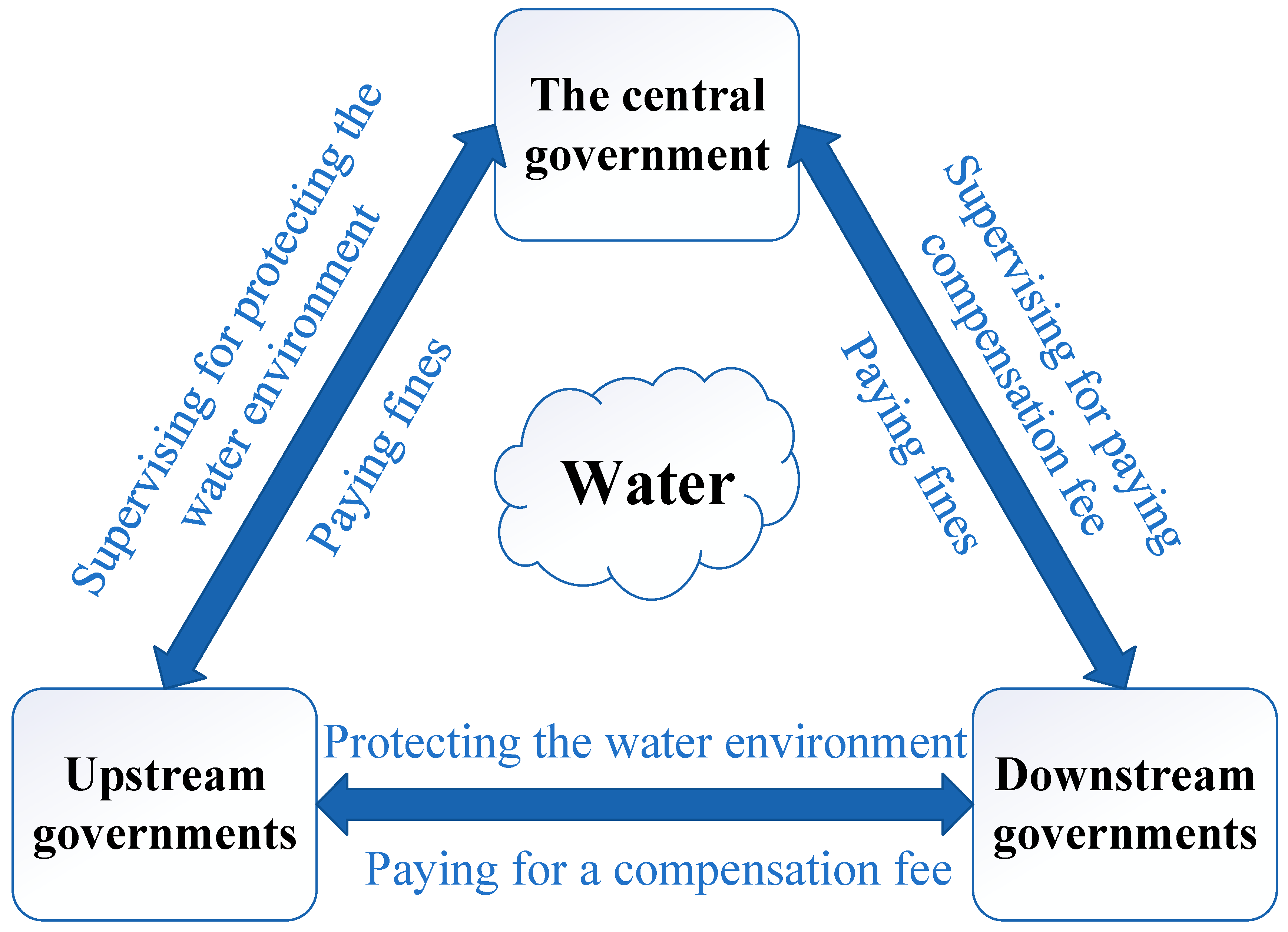
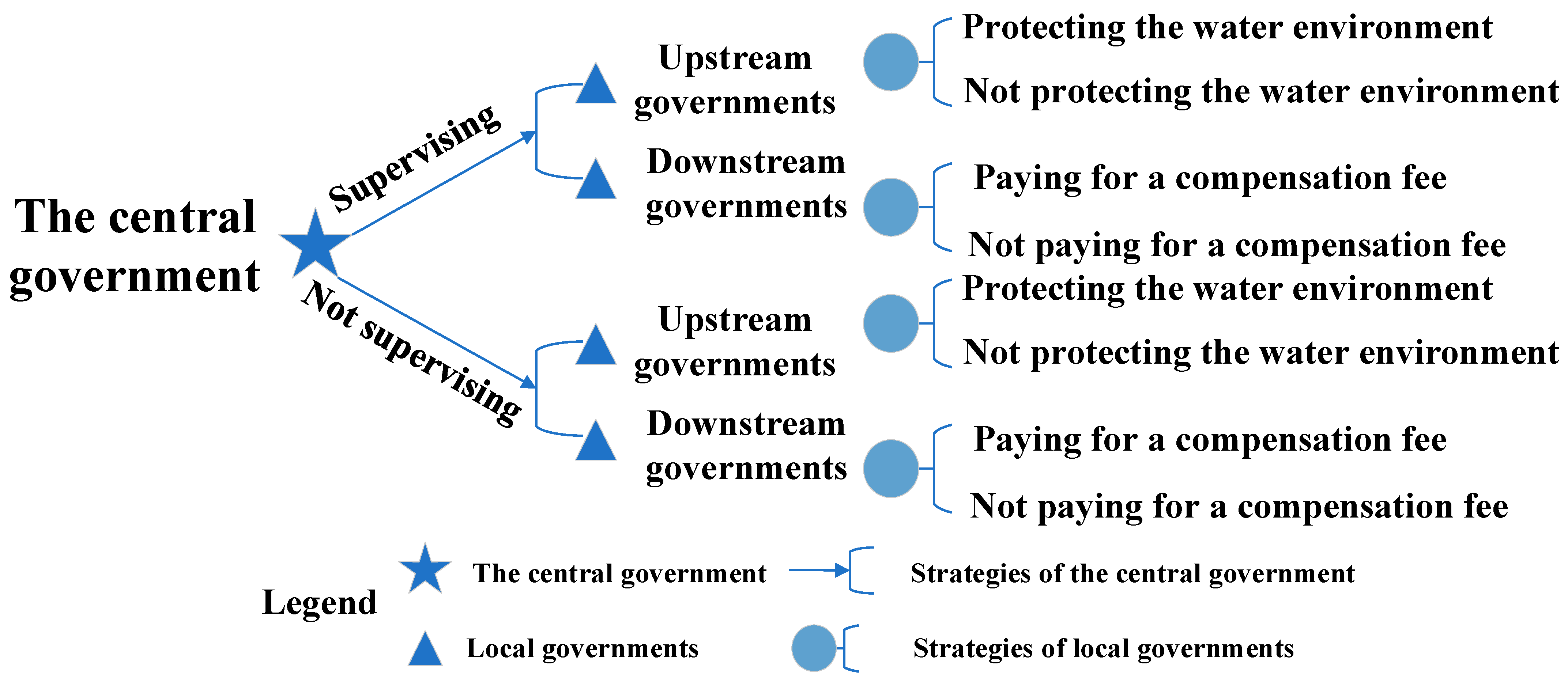
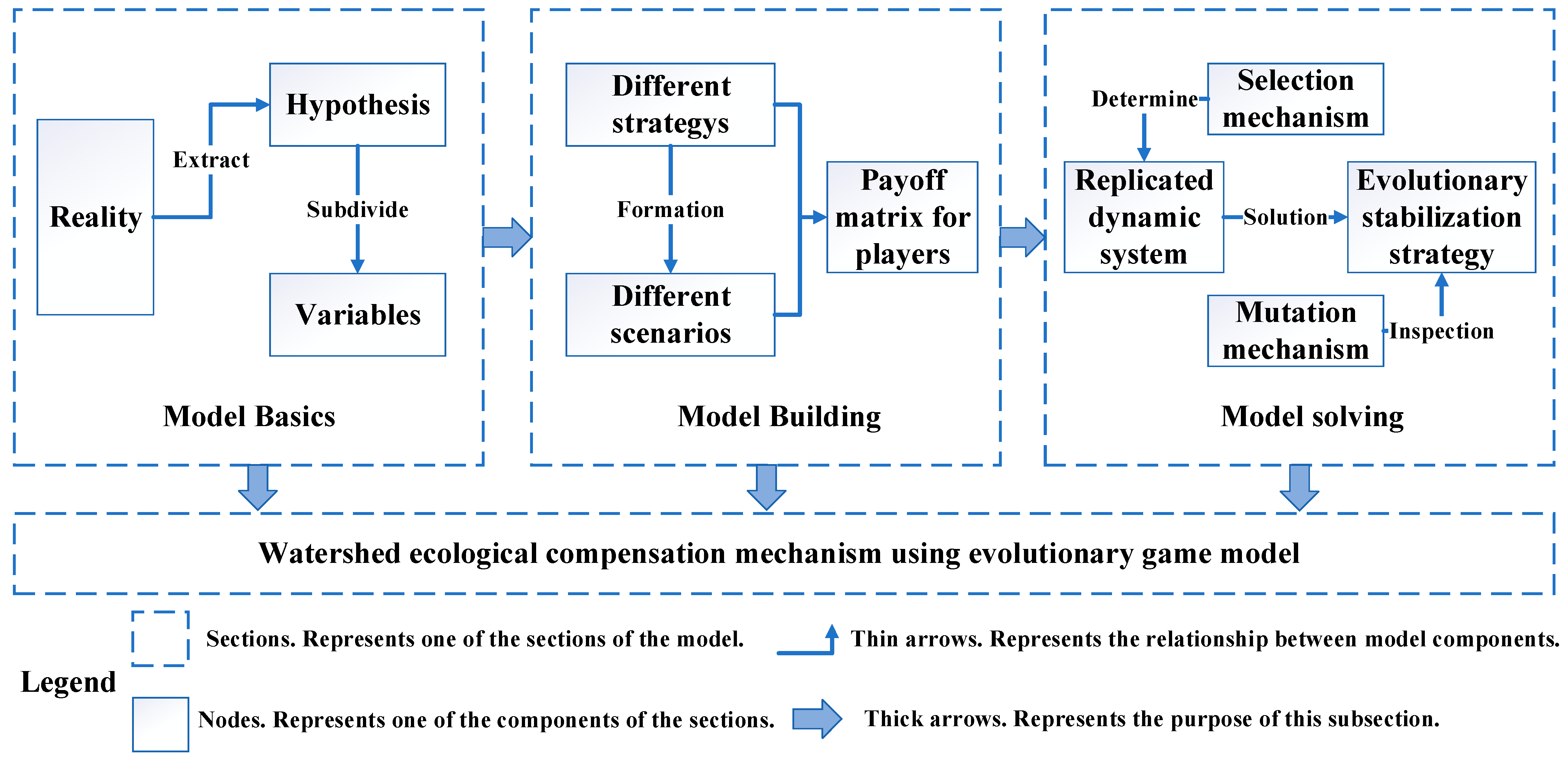
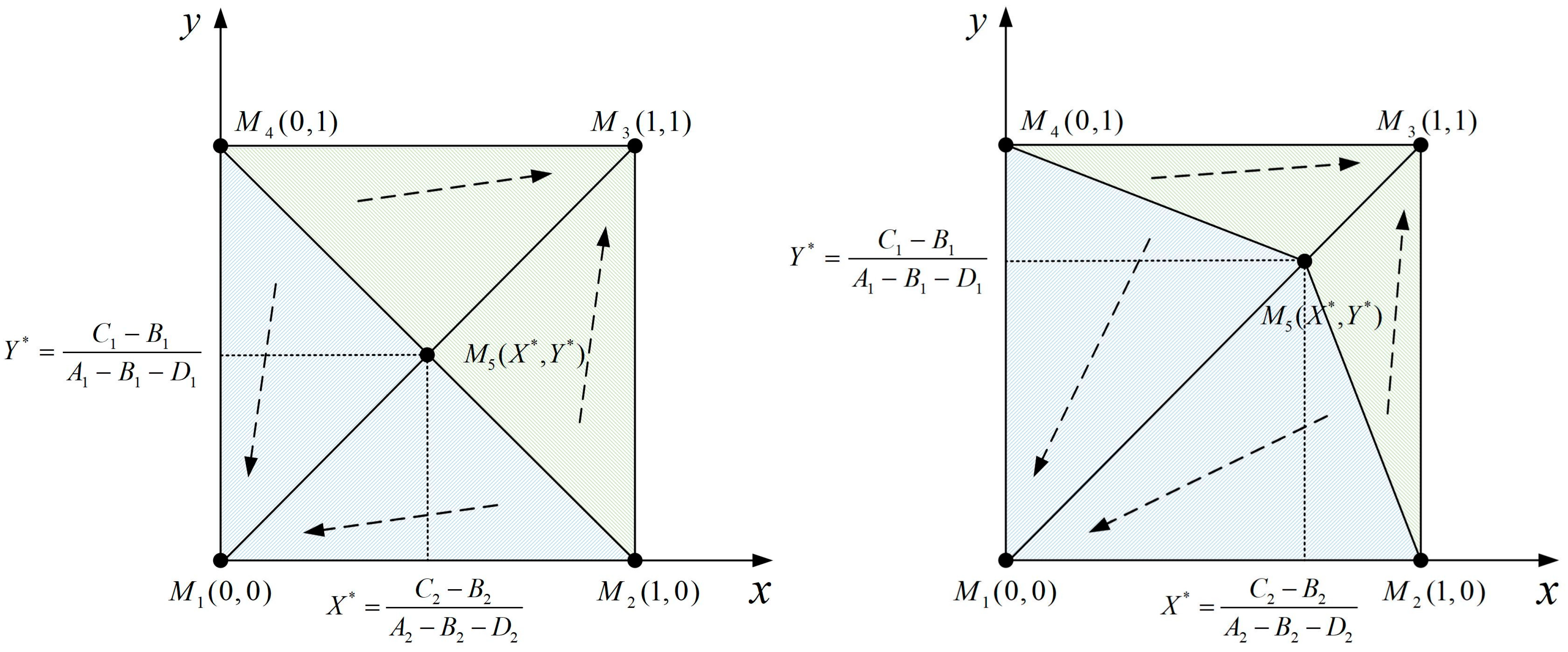
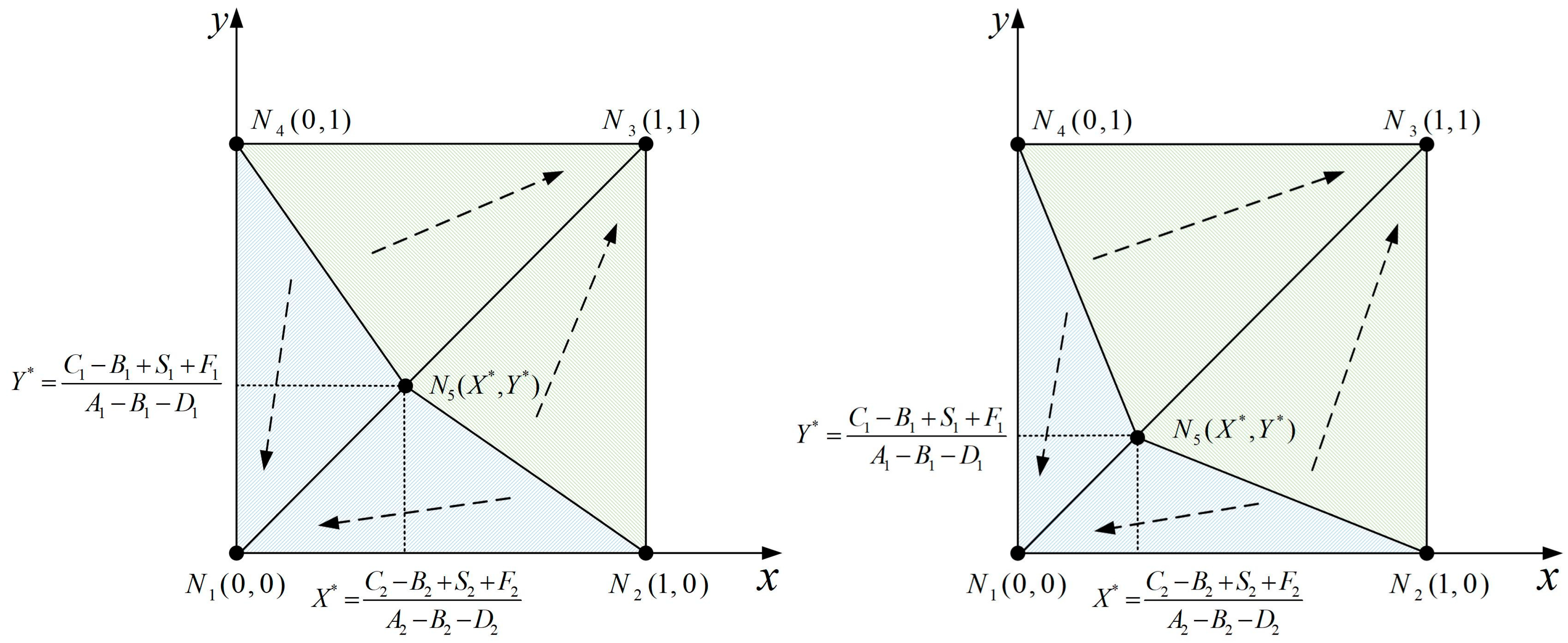

| Governments | Value | Strategies |
|---|---|---|
| Upstream governments | 1 | Protecting |
| 2 | Not protecting | |
| Downstream governments | 1 | Compensating |
| 2 | Not compensating | |
| The central government | 1 | Supervising |
| 2 | Not supervising |
| When the Central Government Does Not Supervise Local Governments | |||
|---|---|---|---|
| River basin and strategies | Upstream governments | ||
| Protecting (X) | Not protecting (1–X) | ||
| Downstream governments | Compensating (Y) | ||
| Not compensating (1–Y) | |||
| Equilibrium Points | Det(J) | Tr(J) | Stability |
|---|---|---|---|
| M1 (0, 0) | + | − | ESS |
| M2 (1, 0) | + | + | Unstable |
| M3 (1, 1) | + | − | ESS |
| M4 (0, 1) | + | + | Unstable |
| M5 (X*, Y*) | + | 0 | Saddle point |
| When the Central Government Supervise Local Governments | |||
|---|---|---|---|
| River basin and strategies | Upstream governments | ||
| Protecting (X) | Not protecting (1–X) | ||
| Downstream governments | Compensating (Y) | ||
| Not compensating (1–Y) | |||
| Equilibrium Points | Det(J) | Tr(J) | Stability |
|---|---|---|---|
| N1 (0, 0) | + | − | Unstable |
| N2 (1, 0) | + | + | Unstable |
| N3 (1, 1) | + | − | ESS |
| N4 (0, 1) | + | + | Unstable |
| N5 (X*, Y*) | + | 0 | Saddle point |
| Water Quality Grades | Class I | Class II | Class III | Class IV | Class V |
|---|---|---|---|---|---|
| Weights | 1 | 2 | 3 | 4 | 5 |
| Kernel Function | Marginal Effect (Million) | |
|---|---|---|
| CNY | USD | |
| Epanechnikov | 1848.57 | 291.33 |
| Gaussian | 1086.31 | 171.20 |
| Quadratic | 1269.54 | 200.08 |
Publisher’s Note: MDPI stays neutral with regard to jurisdictional claims in published maps and institutional affiliations. |
© 2022 by the authors. Licensee MDPI, Basel, Switzerland. This article is an open access article distributed under the terms and conditions of the Creative Commons Attribution (CC BY) license (https://creativecommons.org/licenses/by/4.0/).
Share and Cite
Zhu, K.; Zhang, Y.; Wang, M.; Liu, H. The Ecological Compensation Mechanism in a Cross-Regional Water Diversion Project Using Evolutionary Game Theory: The Case of the Hanjiang River Basin, China. Water 2022, 14, 1151. https://doi.org/10.3390/w14071151
Zhu K, Zhang Y, Wang M, Liu H. The Ecological Compensation Mechanism in a Cross-Regional Water Diversion Project Using Evolutionary Game Theory: The Case of the Hanjiang River Basin, China. Water. 2022; 14(7):1151. https://doi.org/10.3390/w14071151
Chicago/Turabian StyleZhu, Kai, Yuan Zhang, Min Wang, and Hai Liu. 2022. "The Ecological Compensation Mechanism in a Cross-Regional Water Diversion Project Using Evolutionary Game Theory: The Case of the Hanjiang River Basin, China" Water 14, no. 7: 1151. https://doi.org/10.3390/w14071151
APA StyleZhu, K., Zhang, Y., Wang, M., & Liu, H. (2022). The Ecological Compensation Mechanism in a Cross-Regional Water Diversion Project Using Evolutionary Game Theory: The Case of the Hanjiang River Basin, China. Water, 14(7), 1151. https://doi.org/10.3390/w14071151







